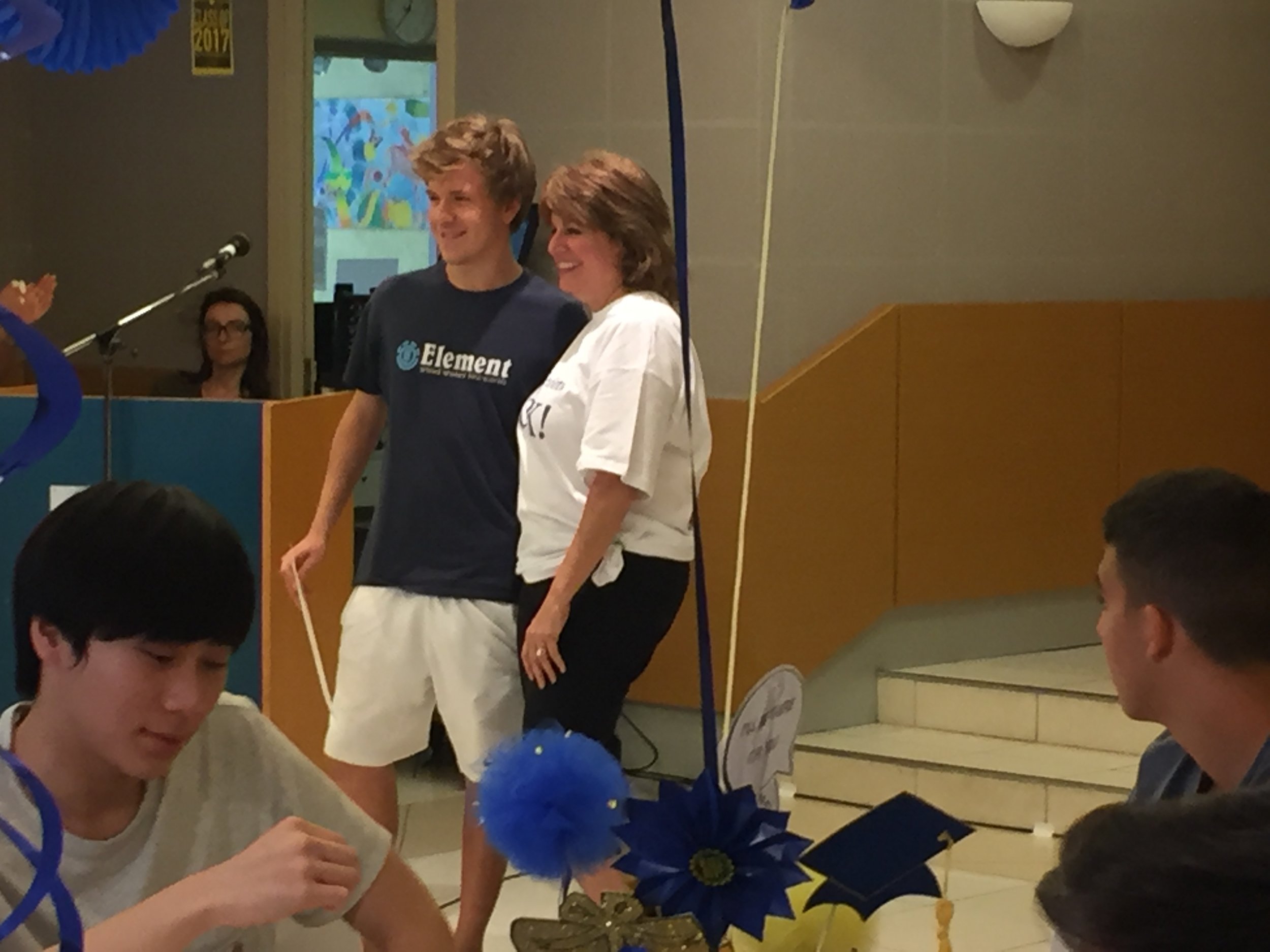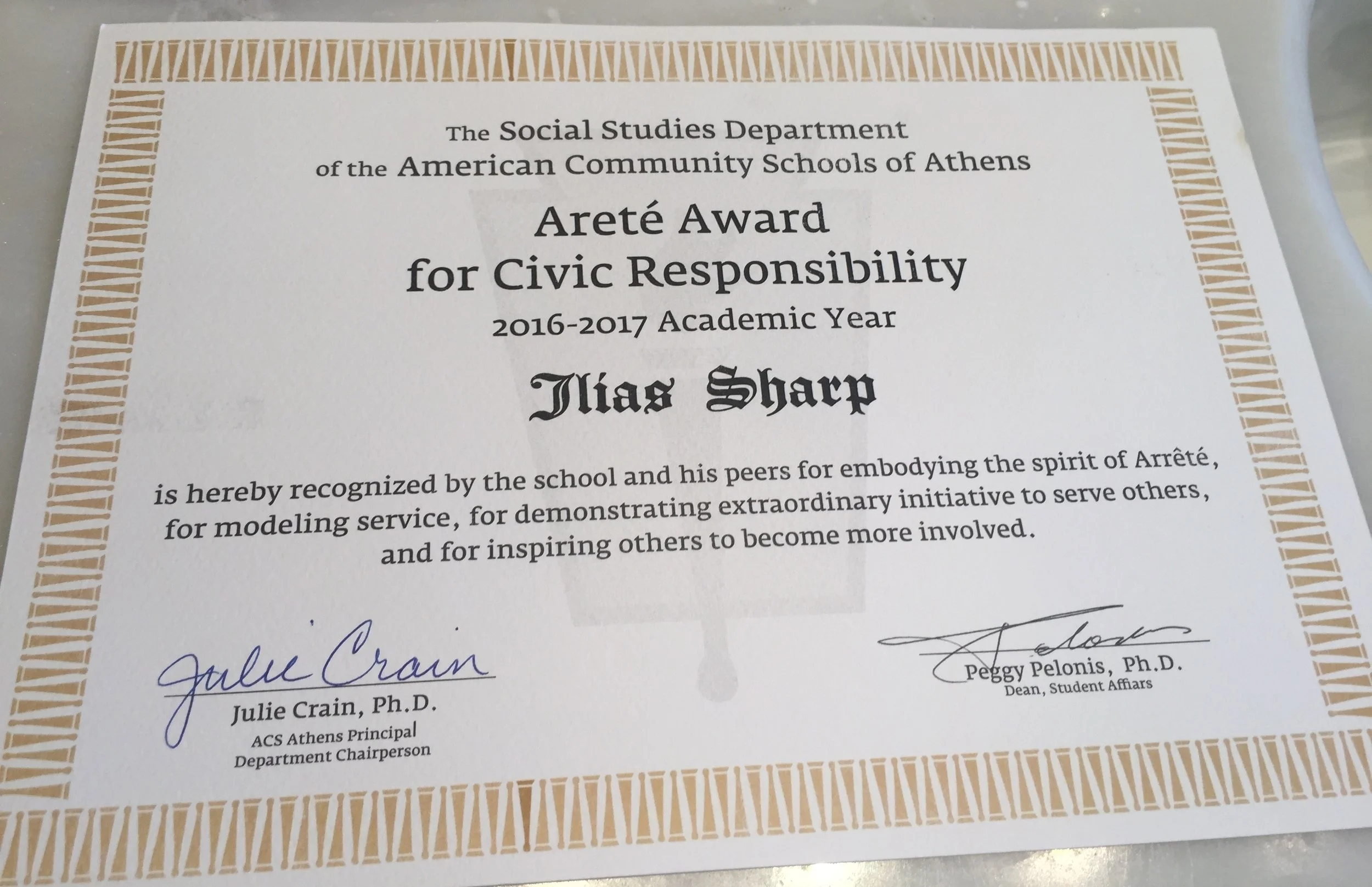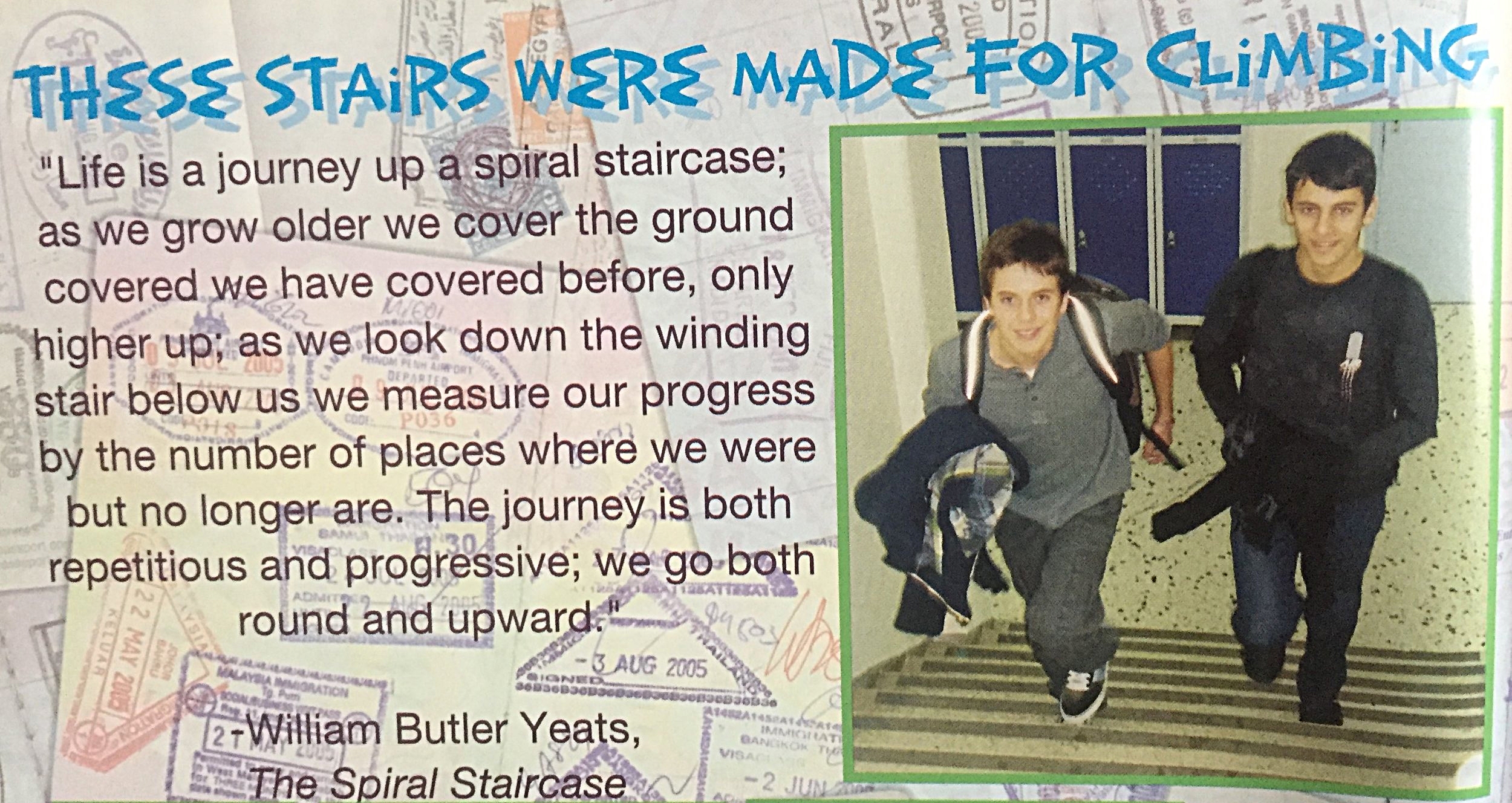Why I Return to the Mothership: Reflections of an ACS Graduate
“It’s the end of an era,” my brother Ilia mused one morning, addressing me, my brother Alexander, and my friend Jason. We are all alumni of ACS (the American Community School of Athens), a K-12 school in Greece. In a few months he would be the last of my family’s current generation to join those ranks.
.....
It was December 21st, 2017: a cold Greek day in a country of mesmerizing warmth. We were making our annual pilgrimage to our school, gravitating back to the mothership where both my parents, aunts, brothers, many friends and I had once lived, worked, thought, played and voyaged.
There were others who did the same that day, 40 to be exact. There were enough names to fill a sprawling board in the famed cafeteria with our names and where we had attended school since we graduated. That warm, familiar place still appeared to be a crossroads of the school. Any combination of people is possible there. You could find an administrator waiting on the sandwich line while a coach rushes by to ask for ice to aid an injured knee, only to run into an Optimal Match specialist he hasn’t seen in a while, but will soon sit on a panel with to discuss the i2Flex method on a livestreamed webcast.
There were few free hands in the house. It seemed each person hand held a cup of fragrant hot chocolate in one hand, and the other held either a kourambie (buttered biscuits sprinkled with powdered sugar) or a melomakarono (honey cookies). The annual spectacle of students, math instructors, librarians, secretaries, and athletes belting out Jingle Bells began to unfold before my eyes.
Among the faces I recognized were children of fellow alumni, with whom I share something important: the experience of growing up here. They may remember the rite of passage of crossing the street that once physically separated the elementary school from the rest of ACS. Perhaps they remember the homework packets, school plays to apply their knowledge of Greek mythology and seeing where it was first set in stone on the Acropolis. Perhaps they remember decorating the inside of their first locker, or treading lightly through a middle school dance.
Perhaps they had an early Eureka moment, mine was learning the power of great design as I watched an egg parachute I had designed in my Design Technology class floating elegantly from the balcony our class had dropped its projects from. Perhaps they remember the intimidation of a great challenge, and the joy of rising to meet it. The moment my eighth grade ears heard that my film review for the Blue and Gold Magazine made me the youngest ever contributor comes to mind. Perhaps they remember the rigor of obtaining an IB (International Baccalaureate) Diploma , which taught me a critical thought process that I still use every day.
Maybe they remember the sense of teamwork they fostered with friends across the classroom desk, between free shots in the back field (or, in my case, between strokes in a swimming team race), behind the debating podium, between bites at a lunchtime yearbook meeting, or between takes in the student newsroom.
I could not shake the question in my mind as I read the names of those who returned: What is the force that brings them back? What is it about ACS that we flip back to as we plan the sentences in our stories of our lives that have yet to be written?
I know I cannot possibly account for the experience of so many who saw ACS in so many ways across so many generations. I hope I can make a small contribution to a discussion about a group of people who have roamed our world—and solar system—and still report back to mission control. Here goes.
1. Mentorship
As I looked back through my history at ACS, I tried to remember the first of many times when I felt a hand of guidance on my shoulder; the hand that never held out an answer, but offered glimpses of new, unexplored ideas and possibilities. It allowed me to see have Eu-reka moments for myself, and delight in the joy of discovery and the satisfaction of stones no longer unturned.
The earliest one I can recall was early in my first year at ACS. We had just been sent off for recess. We may have just completed the unit on the American settlers or nutrition. I recall writing a story about a magical box that gave you whatever you needed at that time. After I thought I had scribbled the story on a set of notebook papers with margins for illustrations on top I dropped it on the assignment pile. I could not contain my excitement for completing the story , or so I thought.
I exclaimed. “I can’t believe such a small box could be so powerful.”
“Did you use the word small?” asked my teacher.
“No,” I said.
“Well, you should,” she added, explaining the power of adjectives to show rather than tell. I penciled that word in and continued.
“Anyway, so about that small, plain box.”
“Did you write plain?”
I saw where this was going, and, hoping for some recess, dreamt up this box in vivid detail, and as quietly as I could.
My teacher’s line of questioning still runs in the back of my mind, like the inner voice that tells us the picture on the wall is crooked, and more importantly, gives us the conscience to set it straight. Advice, often unsolicited, and not speaking from the agenda of a set curriculum but with the voice of conscience that transcends disciplines in our world that defies disciplines, what Dr. Gialamas calls the Global Morfosis Paradigm.
That hand of guidance returned time and time again both to sharpen my tastes (which eventually led me to a Masters Degree in Advertising) and embolden my creative spirit. In high school, I was frustrated with the lack of consolidation in my IB Visual Arts process books (journals that track creative projects from inspiration to execution.) I was encouraged to take a new approach. I knew, from the first time I dared set pen to paper (now stylus pen to tablet) I was cartooning and storyboarding, even before I knew what those things were. Why not tell my process as a story? After all, as I discovered, my natural impulse is to storyboard. Rather than parrot off passages of cave art from a textbook, why not cast a cave painter as the narrator of prehistory? So I did, with the encouragement of my teacher, who gave me source material along the way, including Scott McCloud’s indispensable Understanding Comics. Had my approach been rejected, my process could have remained disorderly. But because I was given the fuel, my best practices had liftoff. This process has carried through to my recent work as a creative strategist in my advertising portfolio , which I am currently showing around New York as I continue on the Great American Job Search.
I know these are only my stories. There may be as many other tales of mentorship as there are hairs under the graduation caps every year. I have read stories of teachers who inspired their children to return to this school as teachers. I have seen teachers who mentor not only as teachers, but also as athletic coaches, debate moderators, student magazine editors, book club coordinators, student council advisors, math club proctors, and conference panelists at the strike of the 3:45 PM bell. Those restless guiding hands remind me that the day comes to a close but teaching and learning never do.
2. Reflection and Remix
I believe ACS encourages those creative leaps that bring the world of the imagination out in the stratosphere within reach. By understanding the world as we know it (what it is and how it works), we can then question and rebuild it.
As I wrote in an earlier post, the unexpected association of unrelated ideas is the mental clay whose form is as flexible as the limits of human imagination. The process of remix has given us some of the greatest ideas and inventions we depend on today, like the way Larry Page and Sergei Brin envisioned Google by imagining web links as a series of bibliographical citations that endlessly link back to other sources. Those simple mental leaps simply changed our world.
I believe the long-standing Truman Trial in the famed 10th grade “Combo” (American Studies / Literature) class is a form of remix. The necessity of former US president Harry Truman’s decision to drop the atomic bomb rested in the hands of my team of lawyers and our witnesses as the entire school tuned in online and in person. With the gravity of this case upon us, I felt we had a personal stake in the course of history where our role could have been passive. The engagement with such a charged case reminds me of the difference between coasting along as a passenger and steering the starship. Sitting at the captain’s helm gave me and my team pause before every argument we added to our case, and every cross examination I did. The stakes were high, so the lessons of the trial remain unforgettable.The intricacies and curveballs the case threw at us, like the resurrection of Machiavelli as a defense witness, have conditioned my brain to a state of remix. This openness to new ideas and associations have helped kick my ideas into hyperdrive. The time where my advertising class studio team envisioned LEGO blocks as the portal to a digital in-store experience comes to mind. Had my school not taught me to be open to new connections, I may have never made them.
I know this kind of thinking still abounds at ACS. I am so impressed to read about student revelations on the famed Humanities trips, and other excursions that ask the big questions and ask what makes a place like Greece unique. Each of the many excursions reminded me that Athens is a place of limitless remix where the past, present, and future are in constant conversation. The sprouting of student work on student portfolios and blogs seems to encourage the free flow of knowledge and reflection across the disciplines, both for the students, and their global viewership. Dr. Gialamas’ knots come to mind as the symbols of the infinite feedback loop of reflection and rethinking in learning.
I believe Ilia would never have devised the 1.50 Club had ACS not taught him to search for new ways to see his world. It was a simple insight that € 1.50, a typical price for an iced Greek coffee, can buy a boxed lunch for a student in need. That alone ignited a powerful partnership with DIATROFI, an initiative within the impactful PROLEPSIS Organization that has helped feed food-insecure children all over Greece.



3. Community
The “C” in ACS for me is as inseparable from the experience as the letter is from its title. Community at ACS has an international perspective. It means your language teacher may have another degree in concert music from a country that neither you nor she is from. Community means that your athletic, forensic, and university-related travel itinerary reads like the content of your European geography quiz. Community means that the nationalities of your friend group read like a U.N. delegation.
I am proud to be woven into this school’s rich community-wide culture that I think informs my perspective today. I found an outlet through that community in the TEDx Youth Talks when I was so thrilled to have rediscovered comics as the engine behind my creative process and I decided to give a talk that took the audience through my process. I remember following the expressions of the faces I recognized in the front rows of that darkened theater; students, parents, and teachers I had grown up around, experiencing each epiphany like their own. When it was my turn in the audience, I found myself in as much awe of the stories I heard as my own. Everyone watching the stage from their seat or living room heard stories of space elevators, the power of smiling, at-risk outreach in Greek villages from friends, teachers, and faculty. As often happens at our school, the line between teacher and student faded. Learning soared.

I felt that same community focus in ACS’s Summer Leadership Institute . When other participants and I began defining our ideas and perceptions of leadership, I originally defined leadership as the work of visionary individuals. But as we walked the halls of the University of Richmond and Washington DC area churches, museums, political offices and murals where leadership was a function of responsibility to a community, I began to see the common ground between leader and follower.
I remember a moment where that distinction melted entirely. We were in the ACS library, a few days before we flew to DC for the second part of our training. We did a dance routine in shiny top hats trying hard to put our best left foot forward. I wondered at the time about the relevance of this activity to leadership, but stepping back into our unfortunate chorus line, I remembered that we were in a row formation, where the back rows mirrored the front. There were leaders, there were followers. We all served the dance, which bonded that little cross section of our community, and our (mercifully) small audience.
In my experience, I believe the small moments define the meaning of community at our school as much as the turning points: The collective gasp of relief in an IB or SAT exam when we realized the material we studied is what appeared on the test; the cheer and laughter of student athletes, coaches, and parents as they view the annual Sports Banquet slideshow ; the insights that crackled across the auditorium while we watched a Yannis Simeonides’ brilliant rendition of Plato’s Apology after we had all read it over the summer ; The buzz in the Incubator or the state-of-the-art Sabbagh Media Studio where ACS comes together to flex its creative muscles; The snap of the camera shutter that captured the cover of the ETHOS Magazine where my brothers and I were photographed with several dozen children of alumni who also attended ACS; the notification that invites young ACS alumni to their very first NHSA (National Hellenic Student Association) convention where Hellenic ACS alumni have thrived in their respective communities around America and passed the torch onward.
Before we went home on that cold, yet warm Greek day, I looked back at the constellation of alumni signatures across that cafeteria wall, and the inspiring young people about to join their ranks. I looked back at the mentors among them, and the very process of reflection they had taught me, the examined life they encouraged me to live. My years at that school helped to make sense of the moments that came after, including this one.
In a way, Ilia was right. In a way, it was the end of an era. A generation of my family at ACS would end with him. But I knew, after years of returning, that we may drift, but everything we learned and learned to love about our school keeps us in orbit.













